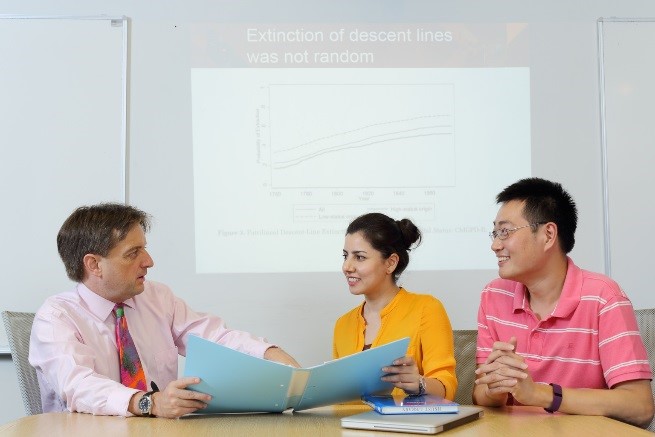Master of Philosophy in Social Science
Doctor of Philosophy in Social Science
MPhil(SOSC)
PhD(SOSC)
Both full- and part-time
MPhil
Full-time: 2 years
Part-time: 4 years
PhD
Full-time: 3 years (with a relevant research master's degree), 4 years (without a relevant research master’s degree)
Part-time: 6 years
RPg Programs Coordinator:
Prof Li HAN, Associate Professor of Social Science

The Master of Philosophy (MPhil) Program is designed to provide rigorous training in the research methods required to conduct substantive research in one of the following disciplines related to China (in the majority of instances): demography, economics, geography, political science, psychology, and sociology. The MPhil degree is intended to facilitate students interested in pursuing a PhD degree.
The Doctor of Philosophy (PhD) Program is designed to prepare students for careers in academia, policy research or consultancy related to the affairs of society, polity or the economy. A candidate for a PhD degree is expected to demonstrate mastery of knowledge in the chosen discipline and to synthesize and create new knowledge, making an original and substantial contribution to the discipline.
On successful completion of the MPhil program, graduates will be able to:
- Make effective use of the basic methods of social research;
- Critically review existing literature in relevant fields; and
- Independently develop and undertake studies to address theoretically relevant and empirically revealing questions.
On successful completion of the PhD program, graduates will be able to:
- Make rigorous use of diverse methodological tools for social analysis;
- Creatively design and effectively carry out research that makes significant theoretical and/or empirical contributions to relevant fields; and
- Publish high-quality research output in leading academic venues.

The programs are offered by the Division of Social Science, with the following research foci.
Research Foci
Research focuses primarily on the evolving economy, polity and society of Mainland China in comparative perspective. Specific topics encompass economic reforms and development, social stratification and mobility, contentious politics, foreign policy and relations, historical demography and migration, environmental policy, emotions and the Chinese personality, as well as broad issues pertaining to gender, culture and the role of innovation and technology in society.
- Minimum Credit Requirement
MPhil: 15 credits
PhD: 27 credits
- Research Methodology Courses
MPhil: 9 credits
PhD: 12 credits
Subject to the approval of the supervisors and the PG Coordinator, PhD students may also take other advanced statistics or econometrics courses not specified in the list to meet the methodology course requirements.
- Required Courses
MPhil:
A minimum of 6 credits of postgraduate courses offered by the Division of Social Science. Subject to the approval of the supervisors and the PG Coordinator, students may also take MGCS courses offered by the Division for the MSc Program in Global China Studies to meet the coursework requirement. Additional coursework may be required as a part of the research preparation.
PhD:
A minimum of 15 credits of coursework, of which at least 9 credits have to be taken as taught courses, and 6 credits among courses designated by the PG Committee as relating to the students’ major field of studies.
- Graduate Teaching Assistant Training
All full-time RPg students are required to complete PDEV 6800. The course is composed of a 10-hour training offered by the Center for Education Innovation (CEI), and session(s) of instructional delivery to be assigned by the respective departments. Upon satisfactory completion of the training conducted by CEI, MPhil students are required to give at least one 30-minute session of instructional delivery in front of a group of students for one term. PhD students are required to give at least one such session each in two different terms. The instructional delivery will be formally assessed.
-
Professional Development Course Requirement
Students are required to complete PDEV 6770. The 1 credit earned from PDEV 6770 cannot be counted toward the credit requirements.
PhD students who are HKUST MPhil graduates and have completed PDEV 6770 or other professional development courses offered by the University before may be exempted from taking PDEV 6770, subject to prior approval of the School.
Students are required to complete SOSC 6400. The 1 credit earned from SOSC 6400 cannot be counted toward the credit requirements.
PhD students who are HKUST MPhil graduates in Social Science and have taken and passed SOSC 6400 may be exempted from taking SOSC 6400, subject to prior approval of the School.
- English Language Requirement
Full-time RPg students are required to take an English Language Proficiency Assessment (ELPA) Speaking Test administered by the Center for Language Education before the start of their first term of study. Students whose ELPA Speaking Test score is below Level 4, or who failed to take the test in their first term of study, are required to take LANG 5000 until they pass the course by attaining at least Level 4 in the ELPA Speaking Test before graduation. The 1 credit earned from LANG 5000 cannot be counted toward the credit requirements.
For PhD students whose native language is not English, and do not have a TOEFL score of over 600 (paper-based total) or 250 (computer-based total) or 100 (internet-based total), or an IELTS score of 6.5 or above, or a score of 4 or above in “HKDSE English Language”, they are required to take a course on English writing offered by the Center for Language Education.
- PhD Major Field of Study
The PhD program is composed of two fields. Each field includes a number of academic specializations:
- Political Economy covers the specializations in politics, economics, regional geography, international relations, and Science, Technology and Society (STS).
- Social Relations covers the specializations in sociology, psychology, anthropology, and demography.
PhD students must choose one of the two fields as their major field of study before the end of their second regular term of study. They should also identify a supervisor in one of the specializations before the end of their third regular term of study, and prepare for the qualifying examination in this academic specialization under the guidance of the supervisor.
- PhD Qualifying Examination
PhD students have to pass a qualifying examination related to their specialization before the end of their fifth regular term of study in order to become doctoral candidates. Students who have been granted 9 or more transfer credits are required to pass the qualifying examination before the end of their third regular term of study.
The qualifying examination will be a four-hour written examination, comprising two questions in each of the three parts: a) social science methodologies; b) general theories; and c) research developments. The student will be required to answer one question in each of these three parts. The student’s Thesis Supervision Committee composes the examination questions, and is also responsible for grading the examination. Students will be graded Excellent, Good, Pass or Fail. The qualifying examination can be retaken only once.
A PhD thesis prospectus should be presented and defended within one regular term after successful completion of the qualifying examination. The thesis prospectus should be a substantial document in the neighborhood of 30 pages, which demonstrates a mastery of the literature on the subject, identifies a significant intellectual problem, and lays out a plan for solving that problem. It must be given to the Thesis Supervision Committee at least two weeks before the scheduled date of the prospectus defense. It is defended during a two-hour discussion with members of the Thesis Supervision Committee. The Committee will either formally approve the prospectus, or specify required revisions to be made within a specified time period for final approval.
- Thesis Research
MPhil:
- Registration in SOSC 6990; and
- Presentation and oral defense of the MPhil thesis.
PhD:
- Registration in SOSC 7990; and
- Presentation and oral defense of the PhD thesis.
Students are expected to work closely with their supervisors on an informal rather than formal classroom basis.
Last Update: 25 March 2021
To qualify for admission, applicants must meet all of the following requirements. Admission is selective and meeting these minimum requirements does not guarantee admission.
-
Applicants seeking admission to a master's degree program should have obtained a bachelor’s degree from a recognized institution, or an approved equivalent qualification;
-
Applicants seeking admission to a doctoral degree program should have obtained a bachelor’s degree with a proven record of outstanding performance from a recognized institution; or presented evidence of satisfactory work at the postgraduate level on a full-time basis for at least one year, or on a part-time basis for at least two years.
Applicants have to fulfill English Language requirements with one of the following proficiency attainments:
-
TOEFL-iBT: 80*
-
TOEFL-pBT: 550
-
TOEFL-Revised paper-delivered test: 60 (total scores for Reading, Listening and Writing sections)
-
IELTS (Academic Module): Overall score: 6.5 and All sub-score: 5.5
* refers to the total score in one single attempt
Applicants are not required to present TOEFL or IELTS score if
-
their first language is English, or
-
they obtained the bachelor's degree (or equivalent) from an institution where the medium of instruction was English.













